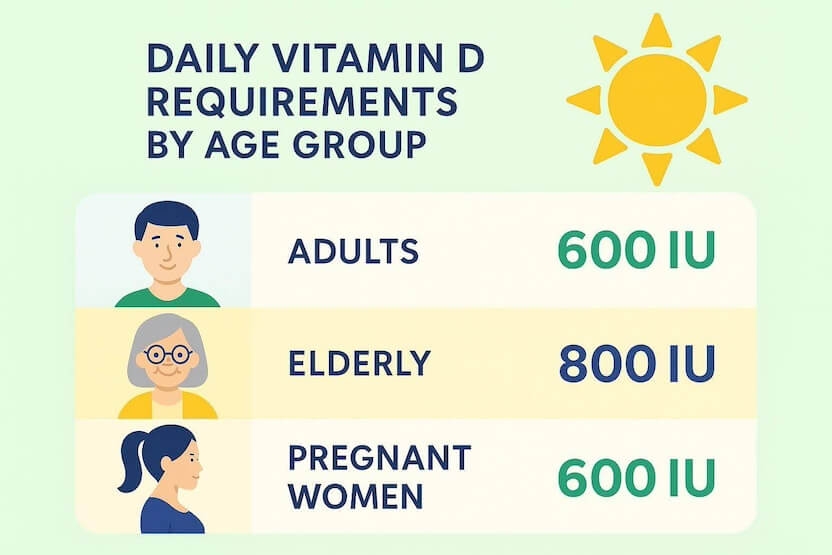Last update: July 17, 2025
4 minute read
The Benefits of Vitamin D: Why the “Sunshine Vitamin” may matter more than ever in 2025
Struggling with low energy or weak bones? Discover how vitamin D supports skeletal health, immunity, and even mood—with dosage tips & 2025 research updates you can trust.

By Derick Rodriguez, Associate Editor
Edited by Stephanie Wright, RN, BSN

Ever wonder why doctors still harp on vitamin D when you already get plenty of sun? There’s more to this fat-soluble nutrient than preventing rickets. Recent studies reveal links to immune balance, mental health, and chronic-disease risk.
Curious about boosting your vitamin D intake safely and effectively? Dive into this complete guide on vitamin D supplements to uncover how small changes can create lasting health benefits.
Key takeaways
- Vitamin D is crucial for bone health, immune function, and overall wellness
- Most people are deficient, with over 50% of adults lacking adequate levels
- Your body can produce Vitamin D from sunlight, but most people need additional sources
1. Builds & maintains strong bones
- Calcium gatekeeper: Vitamin D drives intestinal calcium absorption; without it, only ~10–15 % of dietary calcium is absorbed.
- Fracture & fall prevention: A 32-trial meta-analysis found daily supplementation (800–1000 IU/day) is associated with the greatest reduction in osteoporotic fractures and falls.
2. Modulates immune defenses
- Innate immunity: Researchers report that vitamin D enhances innate immunity by promoting antimicrobial defenses, reducing harmful inflammation, and supporting immune balance.
- Respiratory infections: Updated evidence suggests that vitamin D supplementation does not significantly reduce the incidence of acute respiratory infections, making its protective benefit uncertain.
3. Supports mental health
- Depression link: A large 2021–2023 NHANES analysis showed adults with serum 25(OH)D ≥ 30 ng/mL had 30 % lower odds of moderate-to-severe depressive symptoms.
- Symptom-specific insights: An older study drilled down to anhedonia and fatigue, confirming deficiency predicts higher scores on those domains.
4. Muscle function & fall risk
Adequate vitamin D enhances type II muscle fiber size and neuromuscular control, lowering fall incidence in seniors, which is key to maintaining independence.
5. Potential cancer & metabolic support (early-stage)
Observational data link sufficient levels (≥ 40 ng/mL) to better colorectal cancer outcomes and improved insulin sensitivity, but RCTs remain inconclusive. Stay tuned as the 2024–2026 trials read out.
How much do you need?
Group | RDA* | Upper Limit (UL) | Notes |
|---|---|---|---|
0–12 months | 400 IU | 1000 IU | Breast-fed infants need drops |
1–70 years | 600 IU | 4000 IU | Most adults |
70+ years | 800 IU | 4000 IU | Higher fracture risk |
Pregnant/Lactating | 600 IU | 4000 IU | Monitor with OB-GYN |
U.S. RDAs per NIH ODS.

Sources of vitamin D
- Sunlight: 5–30 min mid-day exposure to arms/legs 2–3 ×/wk (latitude & skin tone dependent).
- Food: Fatty fish (salmon, sardines), fortified milk/plant milks, egg yolks, mushrooms exposed to UVB.
- Supplements: Look for D3 (cholecalciferol) with third-party testing; pair with meals containing fat for better absorption.
Who’s most at risk for deficiency?
- Darker skin tones (more melanin)
- Limited sun exposure (indoor jobs or high-latitude winters)
- Malabsorption disorders (IBD, celiac)
- Older adults (Screening via serum 25(OH)D is inexpensive and guides personalized dosing)
Frequently asked questions (FAQ)
Here are some of the most frequently asked questions about vitamin D.
Final thoughts
Vitamin D is a powerful player in everything from your bone health and immune system to your mood and cognitive function. Ensuring you're getting enough sun exposure, including vitamin-rich foods, and selecting high-quality supplements are all vital steps to achieving those ideal vitamin D levels.
Are you ready to step into the sun for improved energy, stronger immunity, and a balanced mind—or will you stay indoors, leaving your health in the shade?
This article does not provide professional medical advice. Please consult a healthcare provider before making any changes based on the information shared.
Sources and references
- Vitamin D - Health Professional Fact Sheet
- Effect of Vitamin D Supplementation on Risk of Fractures and Falls According to Dosage and Interval: A Meta-Analysis
- Vitamin D: A Potential Mitigation Tool for the Endemic Stage of the COVID-19 Pandemic?
- Does Vitamin D Lower Risk for Acute Respiratory Infections?
- Association of vitamin D with depression prevalence in U.S. adults: a cross-sectional analysis from NHANES 2021 to 2023
- Vitamin D Deficiency and Depressive Symptomatology in Psychiatric Patients Hospitalized with a Current Depressive Episode: A Factor Analytic Study
- Vitamin D and muscle function - ScienceDirect
- Vitamin D and Cancer - NCI
Editor

Derick Rodriguez
Derick Rodriguez focuses on editing health and wellness-related content. With over half a decade of experience in the digital realm, Derick has developed a unique skill set that bridges the gap between complex health concepts and accessible, user-friendly communication. His approach is deeply rooted in leveraging personal experiences and insights to illuminate the nuances of health and wellness topics, making them more approachable and empowering readers with knowledge and confidence.
Author

Stephanie Wright
Stephanie brings over 13 years of diverse nursing experience to the table, having honed her expertise in critical care, mental health, and utilization management. Her journey as a registered nurse across these various healthcare sectors underscores her adaptability and deep commitment to patient care.
At VitaRx, we're not just passionate about our work — we take immense pride in it. Our dedicated team of writers diligently follows strict editorial standards, ensuring that every piece of content we publish is accurate, current, and highly valuable. We don't just strive for quality; we aim for excellence.
Related posts
While you're at it, here are some other relevant articles you might be interested in.

Get your personalized vitamin recommendations in less than
5 minutes.
Get your personalized vitamin recommendations in less than
5 minutes.






